CATIE Honduras
El CATIE tiene presencia en Honduras desde 1983 y obtuvo un reconocimiento como organismo internacional mediante decreto legislativo 163-83, el cual le faculta para desarrollar trabajo de cooperación técnica internacional en el país.
FORTALECIMIENTO DE CAPACIDADES Y POSGRADO
CATIE contribuye con la formación del recurso humano del país en diversas especialidades en las áreas de ambiente: en Cambio Climático, Manejo de Bosques, Socioeconomía, Sistemas Agroforestales, Manejo y Gestión de Cuencas Hidrográficas, así como Agronegocios Sostenibles entre otras.
Al 2021 son 173 los graduados de maestría los cuales se incorporan a la gestión del desarrollo nacional. Un tema de suma importancia para el CATIE en Honduras es apoyar en la transferencia de metodologías aplicadas a sistemas de producción sostenible que aporten a las contribuciones nacionales determinadas (NDC) entre las cuales se tiene contemplado cumplir al 2030; la restauración forestal de 1.3 millones de hectáreas de bosque, reducir emisiones por generación de energía en 16% y reducir el consumo de leña en un 39%. Dentro de estos temas se desarrollaron varias iniciativas las cuales contribuyen y enriquecen la capacidad local para la innovación en materia de adaptación y mitigación al cambio climático.
INVESTIGACIÓN Y DESARROLLO
Proyectos y acciones relevantes del CATIE en Honduras

Se instalaron 6 escuelas de campo y 15 parcelas demostrativas de cacao para masificar el escalamiento de las técnicas de producción. También se instalaron 9 jardines clonales (4 en el municipio de Patuca, 3 en el municipio de Culmi y 2 en el municipio de Catacamas) para multiplicar las 3 especies de cacao que mejor resultado en producción y calidad han tenido en la zona como CATIE R1, CATIE R4 y CATIE R6. De estas se han producido 120 mil plantas con las cuales los productores han recibido el material necesario para seguir reproduciéndolo aún después del proyecto.
A través del proyecto se promueve la formación del recurso humano de las comunidades beneficiarias impulsando a 6 jóvenes hijos de los productores que actualmente cursan el 3er año de ingeniería agronómica. Además, se le brindo un estipendio a 4 estudiantes de la UNAG que apoyaron en el estudio de suelo 500 muestras como parte de su experiencia académica. En esta misma línea se implementó el proyecto ABC con apoyo financiero del Smithsonian Bird Center, donde se brindó a los productores de la zona un lote de árboles frutales y otro lote de árboles de cacao a fin de complementar los esfuerzos en la restauración forestal.
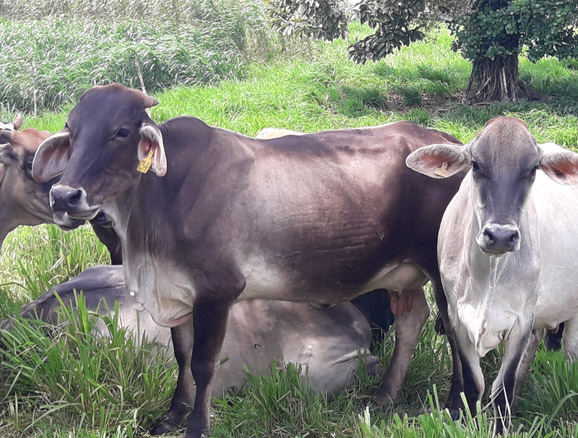
Se trabajó directamente con las 21 asociaciones de la Federación de Ganaderos del Sur FEGASUR, se logró introducir pasto mejorado con adaptación a las condiciones de altas temperaturas y sequía de la zona. También se brindó asistencia técnica en el diseño del modelo de negocio para productos lácteos, especialmente durante la pandemia. Se desarrollaron cadenas comerciales cortas, teniendo en cuenta que durante ese momento era muy difícil la movilización, lo que permitió abrir 50 puestos de trabajo para jóvenes que pudieran distribuir producto en sus localidades a fin de que ellos lograran consolidar una cartera de clientes para abastecerlos de forma continua.
La implementación del modelo de Finca Sostenible permitió desarrollar los planes de finca de los productores participantes, unos 450 atendidos directamente, para incorporar el componente arbóreo con maderables y frutales que agreguen valor al ingreso familiar y provean estabilidad ambiental en las microcuencas degradadas. Los productores además han recibido de forma positiva las prácticas de manejo en las que eliminan la quema de pastos, así como el uso de energía solar para electrificar potreros y la protección de microcuencas para mejorar la captación del agua en el invierno. Se realizó un estudio del clima de negocios de la cadena de ganadería en la región que permitirá una mejor inserción al mercado, también se realizó la primera medición de la huella de carbono en producción ganadera en la región siendo uno de los primeros estudios en esta temática muy importante porque permitirá un Monitoreo Registro y Verificación MRV de impactos en las emisiones que forman parte del compromiso del país, en la que la cadena de ganadería puede aportar una contribución a las áreas restauradas, ya que poseen 650 mil hectáreas dedicadas a este rubro.

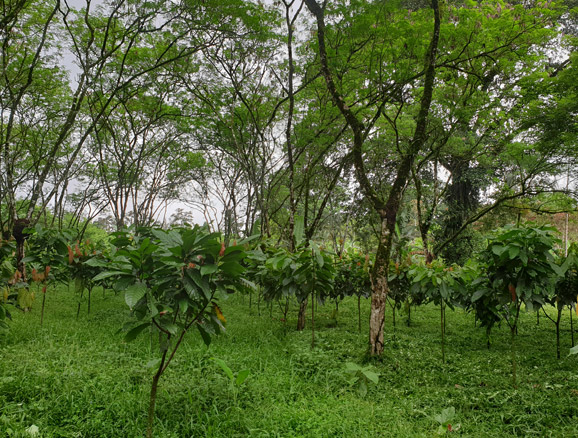
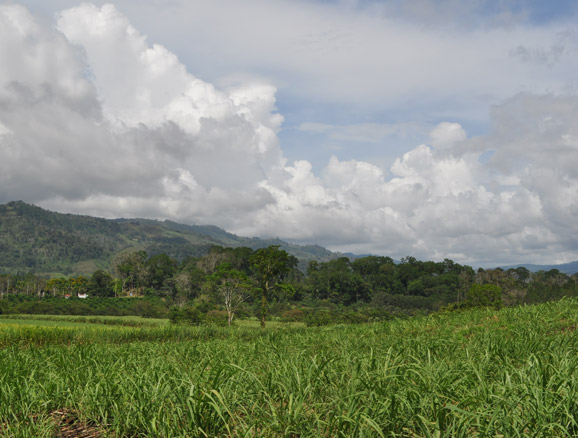
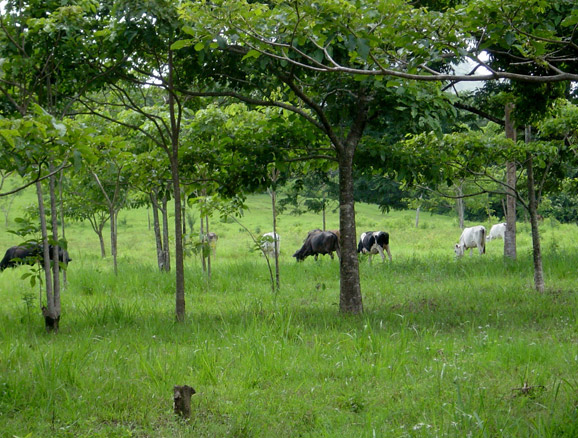
Se preparó una propuesta ante el Fondo de Adaptación para desarrollar el proyecto denominado Usos de Soluciones basadas en la naturaleza para incrementar la Resiliencia a Eventos Climáticos Extremos en la Región Atlántica de Honduras Belice y Guatemala. El proyecto generará impactos en los 55 mil habitantes de la línea marino-costera de los Municipios de Omoa, Puerto Cortes y parte de San Pedro Sula en Honduras. El cual se implementará a nivel local con las municipalidades, la Asociación de Productores de Cacao en Honduras APROCACAOH, la Organización de Desarrollo Étnico Comunitario (ODECO) de la Etnia Garífuna, La Asociación de Lancheros de Omoa y Puerto Cortes y el Centro de Estudios Marinos los patronatos comunitarios, las juntas de agua y los comités de Gestión integral del riesgo.
CASOS DE ÉXITO
Ganadería Sostenible en Honduras
Sr. Santos Benvenuto Portillo Rodas (71 años).
El Sr. Santos Portillo es uno de los ganaderos atendidos por el CATIE, vive en la Aldea de Tapatoca, Municipio de Choluteca a 135 km al sur de Tegucigalpa. Tiene una finca ganadera de 28 hectáreas, las condiciones agroclimáticas de la zona son: bosque seco tropical, la temperatura varía entre 23 a 37 oC, con una precipitación media de 2,065 mm. Los meses con mayor precipitación son de mayo a julio y de septiembre a finales de octubre, lo que imposibilita la dependencia de la lluvia para proveer del recurso hídrico a los cultivos y con un periodo de sequía que puede durar entre 5 a 7 meses.
El problema encontrado
A pesar de poseer la tierra necesaria para proveer los recursos para la subsistencia, esto no se logra debido a la complejidad entorno a la disponibilidad del recurso hídrico. Antes del proyecto, dependían únicamente de pasto local llamado Jaragua (Hyparrhenia rufa), con una división de potreros con un total de 10 parcelas de pasto criollo, de las cuales únicamente contaban con 3 pequeñas parcelas de 1,225 m2 con pasto de corte utilizando zacate King Grass (Pennisetum purpureum) lo que no les permitía prepararse para la época de escases y con enormes dificultades lograban cuidar 30 vacas. Los ingresos por venta de leche no permitían generar auto empleo familiar por lo que dos de los miembros de la familia de 8 debieron salir a vender su fuerza de trabajo.
Alternativas de solución
Con el proyecto se enfocó en la planificación de la finca para tener una idea más clara del concepto de ganadería sostenible baja en emisiones, se mejoró la división de potreros, pasaron de 10 a 18 parcelas de pasto criollo y de 3 a 10 parcelas de pasto mejorado. Pasaron de 30 a 46 animales en mejores condiciones alimenticias de forma sostenible, se aplicó la metodología de ensilaje para almacenar pasto durante el invierno y se logró reservar el alimento necesario para el verano.
Con eso la producción se incrementó de 25 a 70 litros por día y los ingresos se incrementaron casi 3 veces, lo que permitió generar autoempleo y permitió que los dos miembros de la familia pudieran regresar a casa.
En esta experiencia se han beneficiado directamente 30 familias de pequeños ganaderos en los departamentos de Choluteca y Valle y de forma indirecta 20 miembros de la asociación de Ganaderos del Trapiche en el Municipio de Pespire departamento de Choluteca, quienes han ido
adquiriendo las buenas prácticas de sus vecinos, como el plan de finca, la incorporación del componente arbóreo con maderables, la preparación de pasto en ensilaje para el verano y la protección de las fuentes de agua como parte del conjunto de actividades de la Ganadería Sostenible.
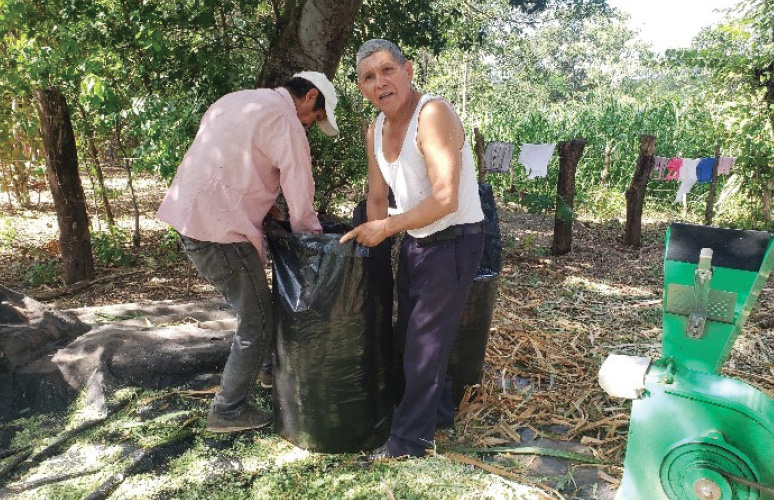
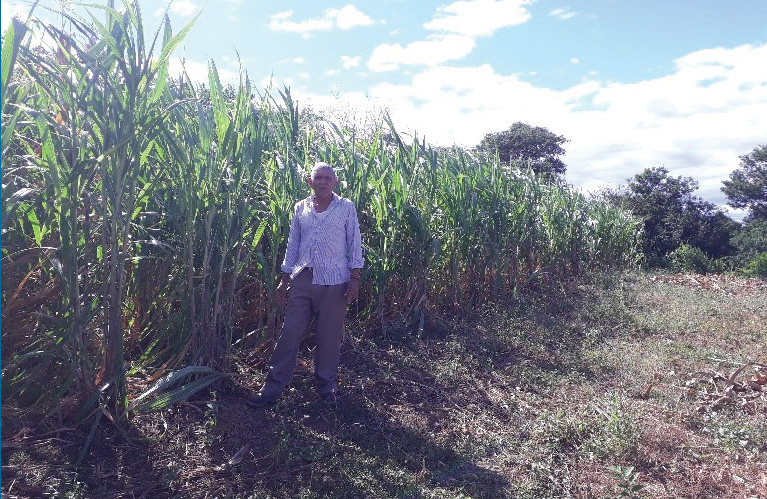
El Ganadero Sr. Santos Portillo en su finca de la aldea de Tapatoca, Choluteca Honduras con uno de sus hijos aplicando la técnica de ensilaje de pastos para el verano. Foto: Técnico del Proyecto CATIE DEIT COSUDE.
SOCIOS ESTRATÉGICOS
El CATIE es miembro activo del GWP por lo que sus resultados en materia de gestión de recursos hídricos aportan a la gestión del conocimiento global.
CATIE impulsó la formación de la plataforma de ganadería sostenible en la que participan instituciones del estado como la Secretaría de Agricultura y Ganadería (SAG), la Secretaría de Energía Recursos Naturales Ambiente y Minas MIAMBIENTE, el Instituto de Conservación Forestal ICF, la empresa privada, la Federación Nacional de Agricultores y Ganaderos de Honduras (FENAGH) entre otros.
